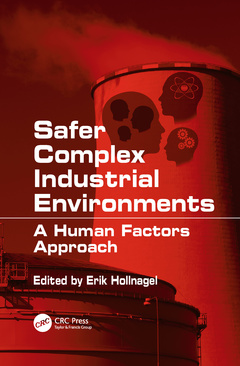Safer Complex Industrial Environments A Human Factors Approach
Coordonnateur : Hollnagel Erik

While a quick response can save you in a time of crisis, avoiding a crisis remains the best defense. When dealing with complex industrial systems, it has become increasingly obvious that preparedness requires a sophisticated understanding of human factors as they relate to the functional characteristics of socio-technology systems. Edited by industrial safety expert Erik Hollnagel and featuring commentary from leaders in the field, Safer Complex Industrial Environments: A Human Factors Approach examines the latest research on the contemporary human factors approach and methods currently in practice.
Drawing on examples mainly from the nuclear industry, the book presents a contemporary view on human factors in complex industrial systems. The contributors contrast the traditional view of human factors as a liability with the contemporary view that recognizes human factor as also an asset without which the safe and efficient performance of complex industrial systems would be impossible. It describes how this view has developed in parallel to the increasing complexity and intractability of socio-technical systems and partly as a consequence of that. The book also demonstrates how this duality of the human factor can be reconciled by recognizing that the human and organizational functions that can be the cause of adverse events are also the very foundation for safety.
Building on this, the book introduces theories and methods that can be used to describe human and collective performance in a complex socio-technical environment. It explores how contemporary human factors can be used to go beyond failure analysis to actively make complex industrial environments safer.
The Background and History of the Institute of Nuclear Safety System (INSS).The Mihama-2 Accident in Today's Perspective. Extending the Scope of the Human Factor. The Meaning of Human Error in the Safe Regulation Model for Risky Organisations. Workplace Safety Climate, Human Performance, and Safety.A Management Process for Strategic Error Prevention. Beyond Procedures: Development and Use of the SAFER Method. A Regulatory Perspective on Analysis Practices and Trends in Causes. An Ironical Outcome of Thorough Accident Prevention. Organisational Influences on Safety Climate in Guanxi-Oriented Cultures. A Comprehensive Evaluation of Licensees’ Efforts on Safety Culture. Hindsight and Foresight.
Erik Hollnagel is one of Europe’s leading experts on industrial safety. He has authored and edited a number of works, including the Handbook of Cognitive Task Design.
Date de parution : 05-2017
15.6x23.4 cm
Date de parution : 10-2009
Ouvrage de 264 p.
15.6x23.4 cm
Thème de Safer Complex Industrial Environments :
Mots-clés :
Safety Culture; Safety Climate; Extending the scope of the human factor; Human Error Events; Workplace safety climate; human performance; and safety; Human Error; A management process for strategic error prevention; Le Bot; An ironic outcome of thorough accidenet prevention; ECCS; Establishing an organizational safety culture; Nuclear Power; International Nuclear Safety Advisory Group; Main Steam Isolation Valve; KEPCO; Nuclear Power Plant; Safe; Human Factors; Al Fa; Group Dynamic; Epidemiological Accident Models; Generation HRA; Prevent Recurrence; Human Factors Engineering; Industrial Safety Agency; Devil’s Law; Regular Inspection Period; Workplace Safety Climate; Optimize Maintenance Activity; Reactor Pressure Vessel



